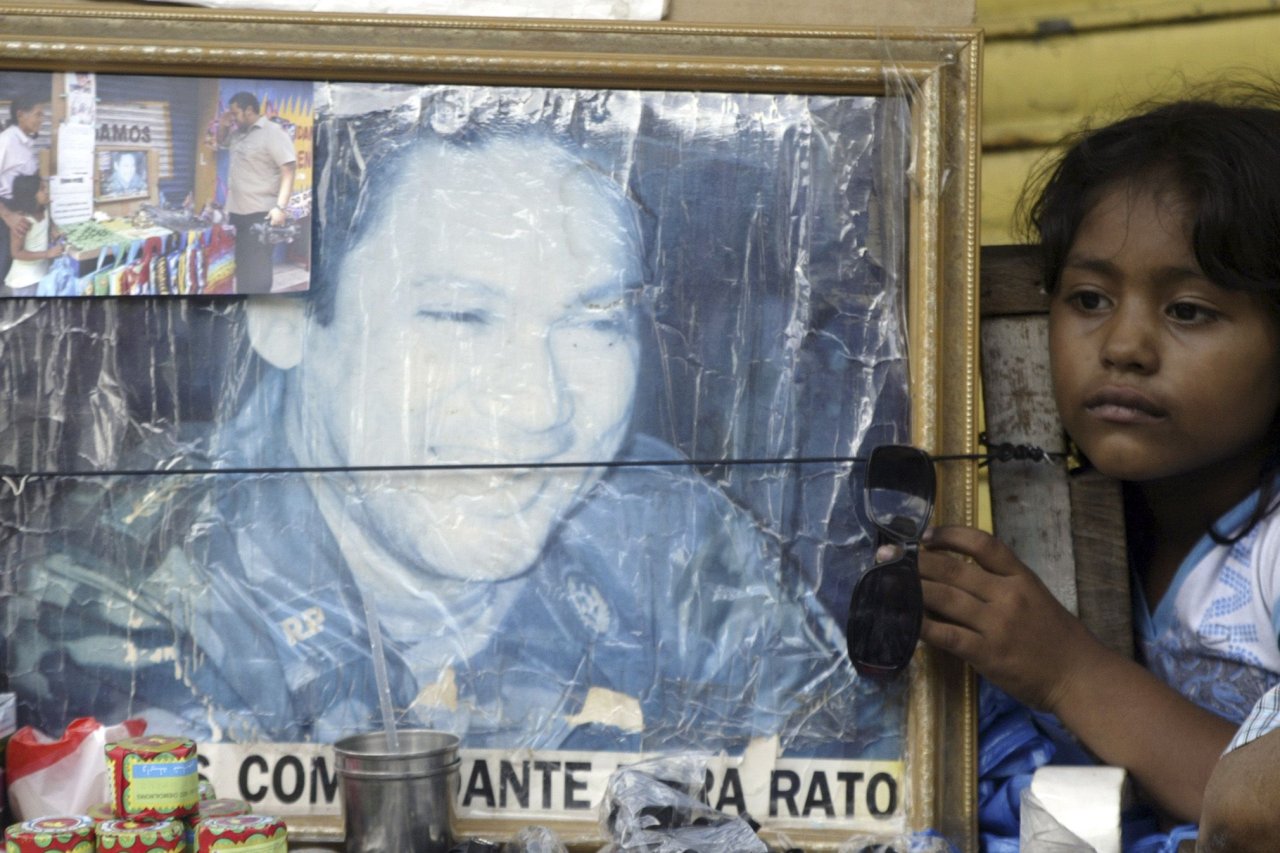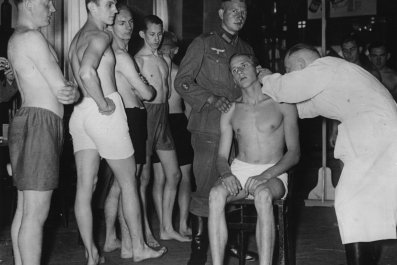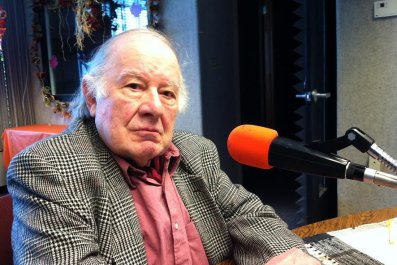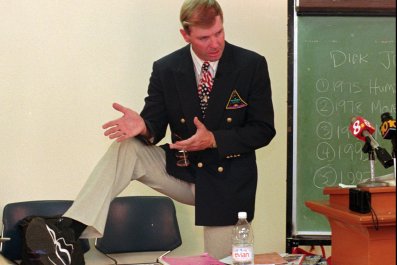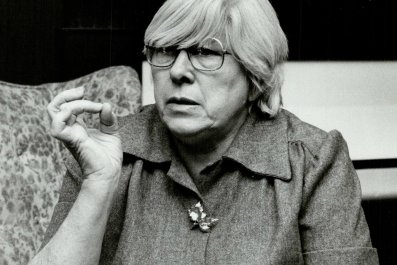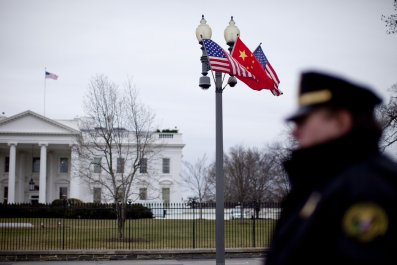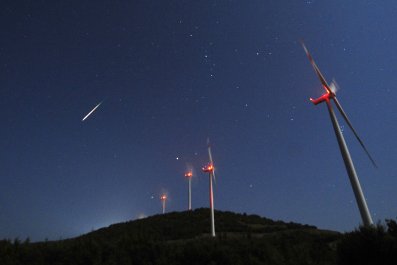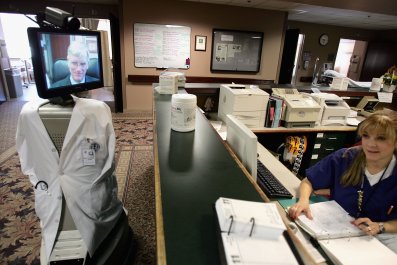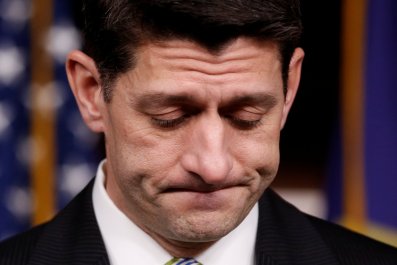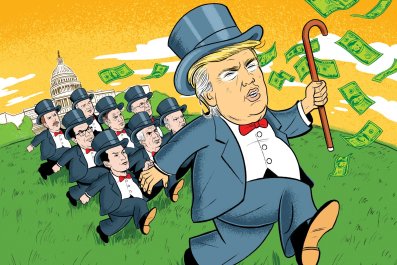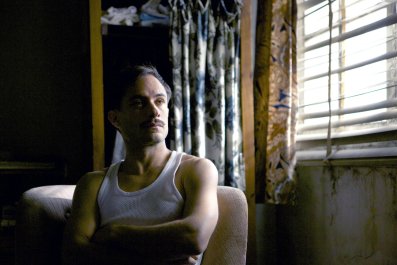Updated | "Did you send cocaine to the United States?"
"Jamás, jamás, jamás!" the man in the orange jumpsuit said. Never, never, never!
It was 1995, and I was inside a federal prison in Miami, interviewing General Manuel Antonio Noriega in a claustrophobic cell. The Panamanian strongman was smaller than I had remembered from when I had tried—and failed—to speak to him years earlier in Panama. He didn't resemble the machete-wielding murderer the U.S. had made him out to be.
I thought of this encounter in March when I learned Noriega was in a coma after brain surgery in a hospital in Panama City (he died on Monday at the age of 83). After our prison interview, Random House hired me to gather his memoirs for a book. What emerged was less a story about Noriega than a cautionary tale about an American president who misled the country for political purposes.
Following about a year of Miami jailhouse interviews, Random House published the memoir, America's Prisoner. The publisher paid a flat fee for my work, and I had no financial connection to Noriega. Separately and independently, I evaluated what he had to say and provided more than 70 pages of analysis of U.S. policy leading up to the invasion. To sum up his view of what had happened to him, Noriega said simply, "You have to create a problem in order to solve it."
The Panamanian general had spent part of his military career on the CIA's payroll. As a student, he was a paid informant on leftist activities. Later, as intelligence chief in the 1970s for his mentor, General Omar Torrijos, Noriega earned the trust of the CIA and its onetime director, George H.W. Bush. And as Panama's supreme leader in 1983, Noriega helped the United States avert a major conflict with Cuba during President Ronald Reagan's gunboat invasion of Grenada, by acting as a go-between with Fidel Castro.
Noriega's friendship with the United States wavered, then collapsed, as Reagan and Bush pursued an anti-communist policy in Central America, giving military and financial aid to right-wing governments and "freedom fighters" against leftist guerrillas in El Salvador and Guatemala and the leftist Sandinistas in Nicaragua. The general refused to help. Those were the years of Marine Lieutenant Colonel Oliver North's abortive campaign to fund Nicaraguan insurgents—the Contras—with money raised by selling weapons to Iran. The scandal, known as the Iran-Contra affair, almost brought down the Reagan presidency.
By the late 1980s, near the end of the Cold War, Reagan was well into his second term. He was also confronting the rise of South America's cocaine cartels and sometimes conflated the communists and the narcos. At one point, he declared, "Latin peoples by the millions" might eventually flee communism to the south and threaten the American heartland. (But even Reagan did not advocate building a wall.) "Rather than talking about putting up a fence," he said, "why don't we work out some recognition of our mutual problems?"
In 1989, the outgoing Reagan administration had charged that Panama was a major transfer point for cocaine shipments en route to the United States. (Then—and now—most U.S.-bound cocaine came into the country through other Central American countries and Mexico.) That May, four months after Bush took office, Panama held its own presidential election. While voters went to the polls every five years, the military had controlled the government since a 1968 coup. Noriega annulled the election when the U.S.-backed candidate appeared to win.
He had reason to think he could get away with such tinkering. The Reagan administration did not complain during the previous presidential election in 1984, in which Noriega's candidate, Nicolás Barletta, was declared the winner by a narrow margin. The leading candidate, former President Arnulfo Arias, had been deposed three times (often with U.S. support) and was an embarrassment to the U.S. due to his pro-Nazi sentiments during World War II. Despite charges of election fraud, Secretary of State George Shultz and former President Jimmy Carter—who as an official election observer would later criticize Noriega for corruption—attended Barletta's inauguration.
In the fall of 1989, Bush's inability to deal with Noriega contributed to his low approval ratings: It made him look weak, a charge that had followed him for years. In 1980, William Loeb, the right-wing publisher of the New Hampshire Union Leader, had derided Bush as "an incompetent wimp," and the word stuck. His political opponents often referred to his Ivy League pedigree and implied he was not capable of taking strong military action. Now Noriega was defying the United States, and the word wimp again was appearing in print. On December 20, 1989, Bush sent 25,000 troops into Panama.
Bush justified the invasion—code-named Operation Just Cause—on national security grounds. Noriega, he said, was a drug dealer who had declared war on the United States, threatened the lives of Americans living in Panama and now threatened the security of the Panama Canal. None of that was proved true. Noriega had not threatened America, and a Panamanian attack on the canal was not even possible. Even without an invasion, the United States maintained Air Force and Navy bases; under the 1977 Panama Canal Treaty signed by Carter and Torrijos, the United States was responsible for security in the Canal Zone surrounding the waterway until December 31, 1999.
As Newsday's Latin America correspondent, I reported from Panama before, during and after the invasion. The United States spent hundreds of millions of dollars to attack a country that offered little resistance. Several miles from the city, billion-dollar stealth bombers hit a Panamanian airfield to stop a tiny air force that had no planes there. Residents of Panama City were at home preparing for Christmas when the American bombs blasted the unlucky neighborhood around Noriega's military headquarters, igniting fires that killed scores of people. Panama's police force and army dissolved, criminals broke out of jail, and looters rampaged through the city.
After less than two weeks, it was over. More than 20 Americans soldiers and three civilians had died, while estimates of Panamanian casualties ranged from 300 to more than 2,000, most of them civilians. Once, during a reporting trip, I saw a charred human torso in a burned-out car and a heap of corpses festering in an open room at the city morgue. Later, after U.S. troops attacked a military academy, I saw the brains of young cadets splattered on the walls.
The American press grudgingly approved of the invasion. "Mr. Bush was not obliged to act," The New York Times editorialized the morning after, "but he was justified in doing so.... The President acted in response to real risks." Bush got what he had wanted: Not long afterward, his poll numbers began to rise.
In interviews, before, during and after the conflict, American civilian and military officials told me there was no justification for the invasion. A top Drug Enforcement Administration official said Noriega had helped prosecute the drug war and safeguard the lives of U.S. agents. Before the invasion, a former CIA station chief in Panama told officials he would likely be able to convince Noriega to leave power without a fight. He was not allowed to try.
Other key U.S. officials resigned rather than participate in the war. General Frederick Woerner Jr., based in Panama as head of the U.S. Southern Command, quit a few months beforehand. Admiral William Crowe, chairman of Joint Chiefs of Staff, also resigned.
Some of the key players involved in the invasion went on to play major roles in the 2003 Iraq War. Dick Cheney was the secretary of defense at the time, Colin Powell replaced Crowe as the newly minted chairman of the Joint Chiefs, and Elliott Abrams was the State Department official leading the charge against Noriega.
Ten days after the invasion, American troops seized Noriega at the Vatican Embassy, and U.S. marshals led him to Miami in chains. Only then did officials in Bush's Justice Department realize they needed some justification for the seizure and imprisonment of a foreign military leader. They dusted off a 1988 indictment that implied a criminal liaison between Noriega and Castro. They later dropped that charge and decided to cobble together more specific claims about Noriega's connection to the Medellín drug cartel.
In 1992, Noriega was tried and convicted on eight drug trafficking and conspiracy counts in federal court in Miami. His 40-year sentence was reduced by 10 years after a former CIA station chief and a former U.S. ambassador spoke on his behalf.
By that time, I had already begun investigating the story. I found more than reasonable doubt about his guilt. The government prosecuted the case with the testimony of 26 convicted drug traffickers who received plea bargains that allowed them to get out of prison and, in some cases, keep their drug profits. One of them was Carlos Lehder, a neo-Nazi from Colombia, then the most important trafficker ever captured by the United States. He had never met Noriega—and neither had the other dealers who testified against him.
U.S. District Judge William Hoeveler, who tried the case, invited me to his home after Noriega's conviction and sentencing for a series of unusual talks in which he expressed concern about how the trial and verdict would be judged. "I hope, in the end, we'll be able to say that justice was served," he said. He and other U.S. officials took solace in the fact that even if the drug conviction was questionable, Noriega was clearly a murderer.
But the sources I interviewed raised serious questions about one charge against him. In 1993, Noriega was convicted in absentia in Panama of conspiracy in the 1985 murder of Hugo Spadafora, a political protégé turned opponent. A key piece of evidence was that the National Security Agency had intercepted a remote telephone communication in which Noriega allegedly ordered the killing: "What do you do with a rabid dog?... You cut off its head."
Multiple U.S. sources told me the intercept did not exist. They said the NSA did not have the capability at that time to capture communications between Noriega—who was in France when Spadafora was killed—and his minions in the Panamanian jungle. I determined that the charges had been made up in part by a Panamanian newspaper columnist and author, Guillermo Sánchez Borbón. He admitted to me he could cite no source for reporting the killing of Spadafora in a book, In the Time of the Tyrants, that he co-wrote with an American expatriate, Richard Koster. "It is a political book, not a historical book," Sanchez Borbón said. "It has its inexactitudes."
Noriega served more than 20 years behind bars in the United States, then in France and finally in Panama, which won his extradition in 2011. I cannot say that he did not commit crimes, including murders, although he told me any killing on his watch took place in the course of military operations. Nor can I say he never allowed drugs to be dealt in Panama, nor would I ever say that he was an enlightened leader. I can say that the charges against him in the United States were very thin. I also concluded that to whatever degree Noriega was guilty, this was a matter for Panama to determine, not the United States.
Correction: A previous version of this story mistakenly said that Noriega was extradited in 2015; he was extradited in 2011. This story has been updated with news of Noriega's death.



